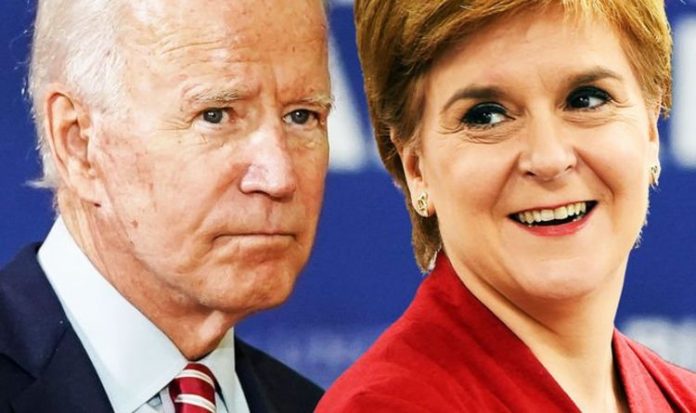Ahead of Scotland’s referendum, Mr Biden, the Democrat Party’s candidate to be the next US President, was about to publicly state where he stood on the question of Scottish independence before he caught himself and gave a diplomatic response. His noncommittal comments came the same day former US President Barack Obama strongly indicated he would prefer Scotland to stay in the UK. While appearing in Iowa, the former Vice President said: “I think the United Kingdom, uh, well look, I learned from Scottish friends, the last thing to do is to suggest to a Scot what he should do.
“So I’m going to stay out of that.”
He said of the US and the UK to the Guardian: “We have a great alliance now.”
There was not any risk for Mr Biden to say whether he believed Scotland should remain in the UK, as President Obama had already indicated he preferred Scotland to keep its ties to Britain.
However, if the Vice President said he supported independence, the administration would have been off message.
As the chances of a second Scottish independence referendum increase, with several opinion polls now giving “Yes” campaigners a consistent lead over their unionist rivals, many wonder what position Mr Biden will take on the matter if he becomes US President.
In an exclusive interview with Express.co.uk, Ronald MacDonald, research professor of macroeconomics and international finance at Glasgow University’s Adam Smith Business School, claimed the Democrat will have no choice but siding with Scottish First Minister Ms Sturgeon.
He explained: “I cannot see Joe Biden not supporting Scottish independence.
“He will have to respect the democratic wishes of the Scottish people.”
He noted: “If we are talking about a situation pre-referendum, I am not sure.
JUST IN: Boris Johnson’s solution to ‘level playing field’ impasse exposed
Despite the Democratic nominee continuing to hold his edge over the incumbent in a handful of crucial swing states, national polls are only part of the story.
In 2016, Hillary Clinton trounced Mr Trump in the popular vote by more than 2.8 million votes, but still lost the Electoral College.
The race came down to a series of upset victories by Mr Trump in key swing states, including Michigan, Wisconsin, Pennsylvania and Florida.







